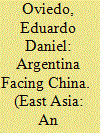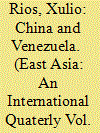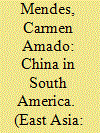|
|
|
Sort Order |
|
|
|
Items / Page
|
|
|
|
|
|
|
| Srl | Item |
| 1 |
ID:
119259


|
|
|
|
|
| Publication |
2013.
|
| Summary/Abstract |
The article explains the Argentine-Chinese economic relations and identifies the interest's network with the ongoing modernization processes in both countries. It can be observed that harmony is more important than discord when Argentina accepts the new China's international division of labor, but when Argentina tends to consolidate the process of economic de-primarization, tensions between both countries tend to emerge. The crisis about crude soybean oil in 2010 is the clearest example to illustrate that trade tensions between both countries will be most frequent if Argentine industrialization continues and the process of policy coordination fails.
|
|
|
|
|
|
|
|
|
|
|
|
|
|
|
|
| 2 |
ID:
119261


|
|
|
|
|
| Publication |
2013.
|
| Summary/Abstract |
The relationship between China and Venezuela has experienced a comprehensive and rapid development in recent years, both economically and politically and in other areas. The establishment of a "strategic partnership" between the two countries in 2001 has defined a stable framework for collaboration. China and Venezuela established diplomatic relations in June 1974 but it was with the start of the presidency of Hugo Chavez (1998) when relations intensified dramatically. In that recognized and open impulse, that Caracas defined as a "perfect match," it should be noted, however, some important reservations.
|
|
|
|
|
|
|
|
|
|
|
|
|
|
|
|
| 3 |
ID:
119258


|
|
|
|
|
| Publication |
2013.
|
| Summary/Abstract |
The growing presence of the People's Republic of China (PRC) in South America highlights its domestic priorities. On the economic side, high levels of development, source of political stability and international recognition, exacerbate the need of importing natural resources and exporting manufactured products. Politically, the policy of national reunification, which is also an important provider of stability drawn from nationalism, demand strengthening relations with countries in areas attracted by Taiwan, isolating the island in the international arena. Beijing is actively working to increase its political leverage and shape the agenda of international politics giving South-South cooperation a strategic dimension well beyond mutual development. This fits South American objectives, namely the ones of Brazil, Argentina and Venezuela, that aim at diversifying international partnerships and perceive China as an alternative to the traditional orientation towards Latin America, the US and Europe. Positioning itself as a stakeholder, China creates the basis for an alternative international order using persuasion. The Chinese soft power in South America may be a drop of water in a much broader strategy.
|
|
|
|
|
|
|
|
|
|
|
|
|
|
|
|
| 4 |
ID:
119260


|
|
|
|
|
| Publication |
2013.
|
| Summary/Abstract |
The first decade of the twenty-first century witnessed a sharp intensification of the relations between China and Brazil. The two countries deepened their commercial links and, as a result, Brazil became China's largest trading partner in Latin America. They have also further improved the quality of their political cooperation by setting up, for the first time, high-level bilateral institutions. Both countries have also been working together within multilateral institutions and mechanisms. The economic causes and impacts of this phenomenon have been widely discussed, but little however has been said about its specific political and strategic dimensions. In order to fill this gap, this article suggests an analysis that looks at the historical context of the relationship between China and Brazil, and sets up an enquiry into the most relevant domestic actors and at the strategic meanings behind their partnership. The goal here is twofold. Firstly, to analyse the role of domestic actors in the intensification of this partnership. Secondly, to discuss to what extent this intensification may be seen as evidence of any strategic interest of China and Brazil to put in place a more proactive, wilful and global foreign policy intended to shape globalisation and the world order.
|
|
|
|
|
|
|
|
|
|
|
|
|
|
|
|
| 5 |
ID:
119262


|
|
|
|
|
| Publication |
2013.
|
| Summary/Abstract |
As China has become the largest greenhouse gas (GHG) emitter in terms of total annual emissions, to promote GHG emissions reduction in China turns out to be crucial to the success of the global efforts to address climate change. This paper explores the development of the Chinese Domestic Voluntary Carbon Market (DVCM) in order to understand how carbon trading institutions have emerged and developed in China. To do this, it traces and analyzes the roles of the Chinese government and other key actors. Through process tracing and literature review, it argues that the pre-legislation and territorially fragmented development pattern of the Chinese DVCM has resulted from the activities of Chinese local governments and non-state actors under the policy experimentation approach adopted by the Chinese central government. It concludes with brief comments on the Chinese policy experimentation approach, and suggests that some measures can be taken to promote voluntary emissions reduction and policy learning.
|
|
|
|
|
|
|
|
|
|
|
|
|
|
|
|
|
|
|
|
|